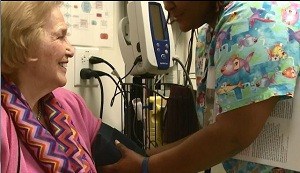Personalized Medicine Overcomes Advanced Lung Cancer
Nov. 26, 2014 | “I feel good. I’m learning my late husband’s business. I play bridge. I talk on the phone with my children and work as a volunteer. I’m as busy as I can be.” That’s Josephine Raye Rogers, a 92-year-old cancer survivor who calls her healing, without question, a miracle. Rogers is the picture of health today, but a little more than two years ago she was diagnosed with stage four lung cancer. She says she’s alive today because of good doctors at UAMS and research on personalized medicine. In the summer of 2012, Rogers says she received a phone call from her grandson-in-law, Daniel Felton IV, M.D. He knew she had not been feeling well and wanted to check in. “I told him, ‘It’s funny you called me now. I have blurred vision,’” Rogers said. “He told me to go the hospital, but don’t drive.” Rogers, who was at her Batesville home at the time, called a neighbor to take her to the hospital. The doctor was concerned because they took a computed tomography (CT) scan and only saw one lung. Rogers was told to go see her cardiologist. “I came to see Dr. Jeanne Wei at UAMS,” Rogers said. “She immediately had me admitted to the hospital.” Rogers was diagnosed with lung cancer and was in and out of the hospital at UAMS for two and a half months. In evaluating her during these initial stages, the multidisciplinary lung cancer team found out she had a specific genetic mutation in her lung cancer cells that would probably enable her to respond positively to a new drug called Crizotinib. “She has a very rare form of lung cancer known as ROS1 mutation,” said Peter Emanuel, M.D., director of the UAMS Winthrop P. Rockefeller Cancer Institute. “She first saw the specialists in our multidisciplinary team to get her diagnosis. Then we took her biopsy and sent it off for genetic analysis. That’s when we learned she had that specific mutation.” And that is where personalized medicine comes in. Personalized medicine has been described as a means to provide the right patient with the right drug at the right time. To put it simply, personalized medicine tailors medical treatment to meet the needs of the individual based on diagnosis, stages of care and genetics. Crizotinib is a targeted therapy in pill form known as a kinase (protein) inhibitor. While it is being used to treat lung cancer that has ROS1 mutations, scientists also are studying its effectiveness against other types of cancer. “Mrs. Rogers never was a smoker. So when she was diagnosed, we decided to evaluate her tumor for genetic mutations that are often seen in patients who never smoked,” said Konstantinos Arnaoutakis, M.D., a hematologist/oncologist at the Cancer Institute. At the time of Rogers’ diagnosis in 2012, Arnaoutakis said there were only two proven and known mutations in non-small cell lung cancers, with a third one emerging. The mutations, or abnormalities in the DNA, can create vulnerable situations that research has shown can be targeted with drugs. | “They often work better than chemotherapy drugs and are better tolerated because they target the most vulnerable aspects of the cancer,” Arnaoutakis said. Even since Rogers’ diagnosis, there have been more advances in research, which shows how fast the science is progressing. “New discoveries are made every day,” Arnaoutakis said. “That’s a good thing about medicine, especially medical oncology. Discoveries are also quicker and translated faster than they were 10 or 20 years ago.” At UAMS, the multidisciplinary lung cancer team works together for the patients. “Dr. Bartter was the first person Mrs. Rogers saw,” Arnaoutakis said. “He gave us more information about her tumor.” Thaddeus Bartter, M.D., is an interventional pulmonologist who often sees patients after an abnormality is found on a chest X-ray. The team worked together on her care for a joint plan, sitting to discuss the diagnosis and prognosis. Arnaoutakis says having a lot of people treating lung cancer from different angles is important. “No one person knows everything,” Arnaoutakis said. “Along with a medical oncologist, we have radiation oncologists, surgical oncologists, pulmonary physicians, pathologists and radiologists. That doesn’t even include the social workers and palliative care team. “Together we make a huge team. That’s very important in treating a patient with cancer,” Arnaoutakis said. Today, Rogers’ lung cancer is in full remission. She says she is blessed to have UAMS and its doctors and nurses. If it had not been for them, Rogers is certain she would not be here. “I am so lucky that I had a receptor that could benefit from the pill,” Rogers said. “I’m a miracle. I think there is another reason I’m here. Maybe if I can bring encouragement to someone who finds out they have cancer, I’ll let them know to have hope. It doesn’t have to be a death sentence.” |

